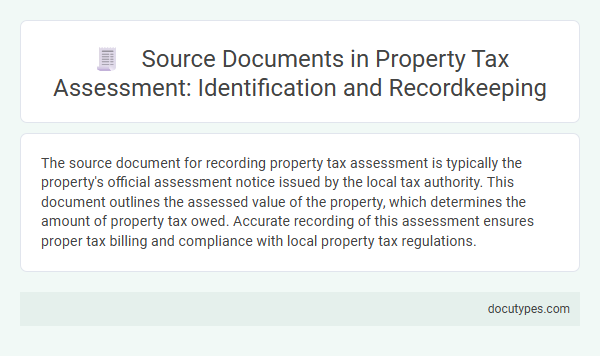The source document for recording property tax assessment is typically the property's official assessment notice issued by the local tax authority. This document outlines the assessed value of the property, which determines the amount of property tax owed. Accurate recording of this assessment ensures proper tax billing and compliance with local property tax regulations.
Introduction to Source Documents in Property Tax Assessment
Property tax assessment relies on accurate source documents to determine the taxable value of your property. These documents provide essential data that local tax authorities use to calculate property tax obligations.
- Assessment Notice - This document officially states the assessed value of the property for tax purposes.
- Property Deed - It verifies ownership and legal description crucial for tax assessment records.
- Appraisal Report - A detailed evaluation report that estimates the market value of the property used in assessment calculations.
Types of Source Documents in Property Transactions
The source document for recording property tax assessment is essential for verifying property details and tax obligations accurately. These documents form the official basis for determining the assessed value and tax rates applicable to your property.
- Property Deed - Legal document proving ownership and outlining property boundaries crucial for tax assessment.
- Assessment Notice - Official communication from the tax authority detailing assessed value and tax amount payable.
- Tax Bill or Receipt - Proof of payment of property taxes, confirming the recorded tax assessment status.
Importance of Accurate Identification of Source Documents
The source document for recording property tax assessment is typically the official property tax bill or assessment notice issued by the local tax authority. Accurate identification of these source documents ensures that property records reflect the correct tax obligations and valuations. You must rely on precise documentation to avoid errors that could lead to disputes or incorrect tax payments.
Legal Requirements for Recordkeeping in Property Tax Assessment
| Aspect | Details |
|---|---|
| Source Document Definition | The source document for recording property tax assessment is the official property tax assessment notice or certificate issued by the local taxing authority or assessor's office. This document details the assessed value of the property used to calculate property taxes. |
| Key Contents of the Source Document | Includes property identification information, assessed value, assessment date, tax rates, exemptions applied, and owner details. It serves as the primary evidence for tax liability and payment requirements. |
| Legal Requirements for Recordkeeping | Property tax records must be maintained in compliance with local and state laws, often requiring retention for a minimum number of years (commonly 3-7 years). Accurate and accessible recordkeeping ensures transparency, facilitates audits, and supports appeals processes. |
| Authority Involved | Local tax assessor's office or county property appraiser is responsible for issuing and maintaining the official source documents. These records are essential for municipal revenue management and legal compliance. |
| Importance of Source Documents | Serve as proof of assessed property value, critical for resolving disputes, verifying tax obligations, and supporting legal proceedings related to property taxation. |
| Record Format and Access | Records may be kept in physical or digital format as mandated by jurisdiction regulations. Digital records enhance accessibility and reduce risk of loss, supporting efficient tax administration and verification. |
Common Mistakes in Handling Source Documents
What is the source document for recording property tax assessment? The primary source document is the official property tax assessment notice issued by the local tax authority. This document contains crucial details such as assessed property value, tax rate, and payment deadlines.
What are common mistakes in handling source documents for property tax assessment? Misplacing or losing the official assessment notice can lead to missed payments and penalties. Failing to verify the accuracy of the recorded property value or ignoring updates from the taxing authority are frequent errors that affect your tax records.
Digital vs. Physical Source Document Management
Property tax assessments are officially recorded using source documents that verify property details and valuation. These documents serve as the foundation for accurate tax calculation and legal records.
Digital source document management allows for efficient storage, quick retrieval, and enhanced security of property tax assessment records. Physical documents require manual handling, greater storage space, and are prone to wear or loss over time.
Source Document Verification and Audit Trails
The source document for recording property tax assessment is typically the official property tax assessment notice issued by the local tax authority. This document contains crucial details such as property identification, assessed value, and tax amount, serving as the primary reference for tax records.
Source document verification ensures the accuracy and legitimacy of property tax records by cross-checking assessment notices with public records and ownership deeds. Maintaining audit trails during this process helps track changes, support compliance, and prevent discrepancies in your property tax assessments.
Best Practices for Organizing Property Tax Records
The source document for recording property tax assessment is typically the official property tax bill or assessment notice issued by the local tax authority. Best practices for organizing property tax records include maintaining a dedicated folder, either physical or digital, that contains assessment notices, payment receipts, and correspondence with tax offices. You should categorize documents by year and property address to ensure easy retrieval during audits or future assessments.
Compliance and Confidentiality in Property Recordkeeping
The source document for recording property tax assessment is the official assessment notice issued by the local tax authority. This document details the assessed value of the property and serves as the primary reference for tax calculations.
Maintaining compliance in property recordkeeping requires accurate and timely entry of data from these assessment notices into official records. Confidentiality is critical to protect sensitive property owner information from unauthorized access. Secure storage and controlled access protocols ensure that property tax data remains both accurate and private throughout the assessment process.
What Is the Source Document for Recording Property Tax Assessment? Infographic

